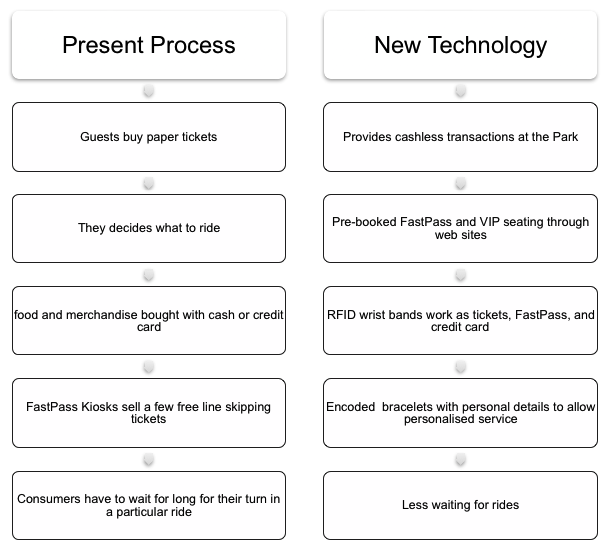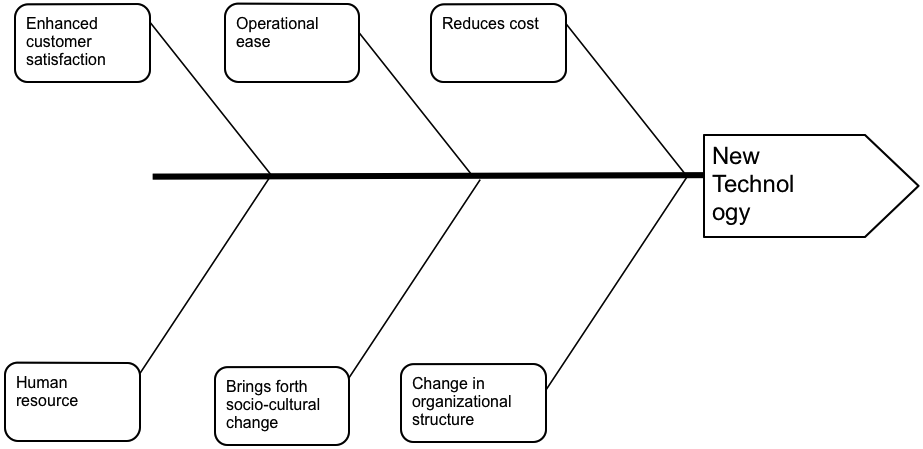Introduction
Literature on organizational change is full of researches demonstrating how technology leads to change within organizations . It can be safely said that when new technology is infused in the organizations, it allows creation of new forms of management within organizations.
In this light of research, this paper tries to undertake a case study analysis of theme park business of the Walt Disney Company and ascertain the effect a technology change would bring about in the organization.
Walt Disney Company is a $42.3 billion company with business segments in media networks, parks and resorts, studio entertainment, consumer products, and interactive media.
CEO and Chairman of the company, Robert A Iger, mention in his letter in the Annual Report states that “Technology remains one of our key priorities because it is transforming virtually every part of our business.”
The reason for the anticipated change in the technology to shape the company’s business is primarily that technology is changing the way consumers’ consumption pattern was changing with changing technology, and may affect the demand for the product as well as the cost and distribution of the products.
Importance of technology to Walt Disney is immense, as the way people today are consuming entertainment and media is changing with change in technology. Further, the company too intends to improve consumer experience through use of advanced technology.
In order to enhance consumer experience for its theme park business segment, Disney has adopted RFID technology to enhance the consumer experience in the theme park through MyMagic+ .
The Company owns a resort in Florida and California. Apart from these, the company owns eighteen resort hotels, two these parks, and Disneyland resorts in Paris, Tokyo, etc, with revenue earning for 2012 at $42 billion.
Understanding the effect of incorporation of this new technology to the organization is an important understanding for organizational researchers interested in ascertaining the effect of new technology on organizations.
This paper tries to understand the effect of the new technology on the business of the theme parks of Disney.
MyMagic+: the new Technology
Technology innovation may be of three kinds – core or critical functions, background or enabling, and emerging or key.
The RFID technology adopted by the Disney theme parks is an essential part of the business as it enables to enhance the experience of the theme parks, keeping the fantasy of the Disneyland, essential element of the theme parks, and enabling the company to keep track of the finances.
Therefore, the MyMagic+ technology incorporated in Disney may be considered a core element to the theme park business. However, with the implementation of this new technology certain operational changes have taken place in the Disney theme parks.
In order to understand this, we need to understand what exactly in the MyMagic+ technology. This technology enables Disney to ensure a cashless transaction with the consumers in its theme parks, where the latter wears a rubber bracelet to the parks that are encoded with credit card information.
All the consumer has to do is “snap up the corn dogs or Mickey Mouse ear with a tap the bracelet on the wrists” . Further, consumers do not have to stand in queue to take a ride, as Smartphone alerts would be sent in order to inform the time when the ride is available to the consumers.
Therefore, the next section will demonstrate how the process of operations and consumer experience is expected to change with the incorporation of the new technology in the Disney theme parks.

The new technology allows changes in the process and experience for the guests in the theme parks. For the customers, the process reduces the inconvenience of procuring paper tickets, long queues, and more personalized experience.
The whole experience at a Disney theme park can be altered by incorporation of the new technology that allows customers to have greater freedom to move around enjoying the park without actually carrying cash or credit card to do the transactions.
Effect of the New Technology
Socio-cultural change
Any new information system technology incorporated in the organizations in bound to change the socio-cultural environment of the organization.
The new technology would definitely bring forth changes in the socio-organizational structure of the theme parks, as new information system implemented would change communication with the guests.
In the previous system, the guests had to communicate with the employees of the park on different occasions such as while acquiring the tickets, inquiry related to the ride timings, the process of waiting, etc. however, with the new system in place, the guests can pre-order many of the things such as tickets, FastPass, the RFID bracelet, etc. online with almost no interaction required with the park employees.
The process, with the help of the new technology, was being transferred to the level where the guests were self-serving themselves, in terms of certain basic functions, while helping the park employees to concentrate on solely on enhancing the park experience.
Therefore, the interaction process will become more flexible and convenient for both the customers and the employees.
Financial
The main purpose of the information systems is to reduce costs in the services sector. The new technology to be adopted by Disney too is expected to reduce a lot of its operational cost. New technology adoption also aims at making the process more cost effective.
Enhancing Customer Experience
Literature suggests that adoption of new technology in the services industry that increases self-service actually enhances customer experience.
Therefore, with the incorporation of the new RFID technology will increase the consumer self-service when guests themselves tap the band to make payments with any assistance from the park employees. This will enhance the experience of the customers and reduce their waiting time considerably.
Human Resources
The implementation of the RFID system will reduce the employees in the ticketing, queue management, employees handling cash or card, and other such functions, as most of the operations would be done through the wristbands.
On the other hand, more employees would be employed to maintain a website for managing the pre-booking requests, and technicians to help operate the RFID system. Therefore, the employees who were simply handling cash and maintaining a simple registry will now have to be aware of the technology.
Further employees would be required to pay attention to the personalized information of the customers. Further, personalization is possible with the help of the new technology.
For instance, earlier Cinderella could say “Hello” to the visitors, however, if the guests choose to share information, the salutation may be done using first name, through the information provided to the employee playing Cinderella.
Marketing
The marketing for the theme parks would become easier tot eh next generation tech-savvy generation as Disney authorities were fearing that their theme parks may lose charm due to the new modes of technology.
However, this new technology would actually allow the company to market their parks using this new feature as a hassle free mode and appeal to the tech-savvy new generation.

Figure 2 demonstrates a fishbone diagram and shows that adoption of new technology brings about various changes in the organization itself. First it changes the socio-cultural background of the organization, thus, changing tremendously the way the organization operates. Further, there is a definite change in the costs.
Though the initial implementation cost of a new technology is high, it eventually reduces tremendously the costs.
Conclusion
Change in technology will inevitably bring about change in the organization. Change management literature is explicit on the changes implementation of new technology may bring forth. Apart from the known changes that technology ushers, there are organization specific changes that must be understood.
Implementation of new technology in an organization changes the whole organization, especially the way the company operated. Therefore, it is inevitable that such a technology change in a organization will change various facets of the organization.
New technology implementation in the theme park would change the way the park operates completely. There will be no need for employees or kiosks with paper tickets, and long queues. Rather, consumers themselves can acquire tickets and the wristbands online and arrange for their vacation in the park in advance.
Reference List
Avgerou, C. (2001). The significance fo context in informaiton system and organizational change. Information Systems Journal, Vol. 11, 43-83.
Barnes, B. (2013). At Disney Parks, a Bracelet Meant to Build Loyalty (and Sales). Web.
Damanpour, F., Walker, R. M., & Avellaneda, C. N. (2009). Combinative Effects of Innovation Types and Organizational Performance: A Longitudinal Study of Service Organizations. Journal of Management Studies, vol. 46 no. 4, 650–675.
Orlikowski, W. J. (2010). The sociomateriality of organisational life: considering technology in management research. Cambridge Journal of Economics, vol. 34 no. 1, 125-141.
Tidd, J., & Bessant, J. (2009). Managing Innovation: Integrating Technological, Market and Organizational Change. London: John Wiley & Sons.
Volkoff, O., Strong, D. M., & Elmes, M. B. (2007). Technological Embeddedness and Organizational Change. Organization Science, vol. 18 no. 5 , 832-848.
Walt Disney. (2013). Annual Report 2012. Web.
Walt Disney. (2013). Our Business. Web.
Zammuto, R. F., Griffith, T. L., Majchrzak, A., Dougherty, D. J., & Faraj, S. (2007). Information Technology and the Changing Fabric of Organization. Organization Science, vol. 18 no. 5 , 749-762.
Zhang, Y., & Li, H. (2010). Innovation search of new ventures in a technology cluster: the role of ties with service intermediaries. Strategic Management Journal, vol.31 no. 1, 88–109.